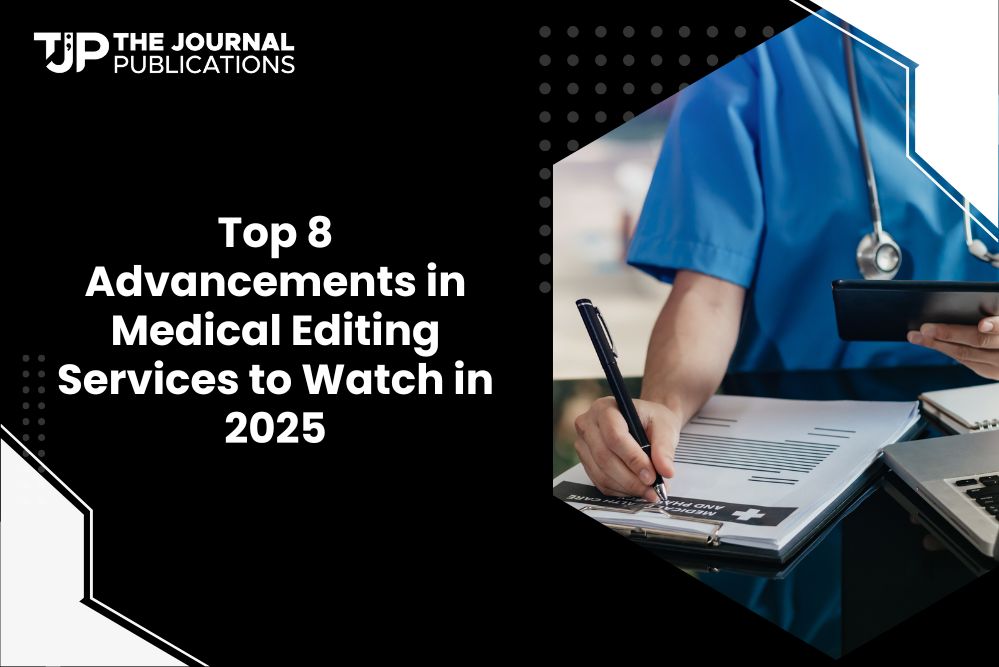Intro
Medical editing services are changing fast. The medical and scientific communities’ needs are changing. So, technology is shifting to meet them. In 2025, medical editors and healthcare pros always stay updated. Here are the top advancements to expect in 2025. They make a big difference in medical editing services.
This blog lists the top eight advancements in medical editing and proofreading services. It shows their significant impact on medical editing and the industry’s future.
Ethical Considerations in AI-Driven Medical Research
AI’s integration into medical research has revolutionized study methods. It has changed how studies are conducted, analyzed, and reported. However, it also introduces complex ethical challenges. Medical editors are at the forefront of ensuring:
- Transparency in AI training data and methodologies.
- Clarity in the interpretation of AI-driven study outcomes.
- Integrity in presenting results without bias or misinformation.
Trusted medical editors, by following these principles, ensure the reliability of AI-driven medical research. Staying alert is crucial for maintaining the public’s trust in new technologies and scientific progress.

Advancements in Medical Image Editing
In 2025, a conditional diffusion model called MedEdit set new standards for medical editing. It transformed how medical images are processed and presented. Features of this technology include:
- Realistic simulations of disease progression, such as changes in brain MRIs, are important.
- Enhanced tools for analyzing imaging data to aid in diagnosis and treatment planning.
- Improved capabilities for integrating images into medical manuscripts.
Medical editors stay updated on these developments. They interpret and present imaging data accurately. This ensures high-quality output in manuscripts and research publications.
Model editing in medical language models
Large language models (LLMs) are being used more in medical research. However, their accuracy and reliability depend on precise updates and corrections. Medical editing specialists are now skilled in:
- Editing factual knowledge within LLMs to correct misinformation.
- Enhancing the explanatory abilities of these models for medical professionals.
- Ensuring that AI-generated content adheres to the latest medical guidelines and ethical standards.
This shows that specialist medical editing is growing. Editors are now shaping reliable AI applications for the medical field.
Tackling Complex Medical Terminology
Medical editors face the constant challenge of interpreting dense medical terminology. To achieve precision and consistency:
- Editors use editing and cross-checking techniques to verify term accuracy and context.
- New training programs give editors the skills to handle diverse medical fields.
These advances make professional medical editing vital for clarity in medical publications.
Staying Updated with Evolving Medical Guidelines
The dynamic nature of medical science demands constant learning. Leading medical and editing service focus on:
- Keeping editors informed about the latest research findings, procedures, and treatment protocols.
- Encouraging participation in webinars, conferences, and medical workshops.
- Providing access to authoritative resources to ensure compliance with current standards.
This commitment to knowledge makes expert medical editors vital to the credibility of scientific publications.
Addressing Sensitive and Controversial Topics
In 2025, medical editors manage sensitive, controversial topics such as:
- Debates about ethics surrounding emerging technologies like CRISPR are important.
- Public Health concerns for the masses about pandemics and vaccine wariness.
- Cultural considerations in global health research.
Editors use a balanced, ethical approach. It ensures that content is accurate, respectful, and free of misinformation. This meticulousness reinforces the trustworthiness of online medical editing services.

Utilization of Collaborative Platforms and Editing Tools
Advanced platforms and tools now make collaboration central to medical editing. These include:
- Google Docs for live teamwork and revision management.
- Software for managing references, such as EndNote or Zotero, makes it easy to integrate citations seamlessly.
- AI-driven editing tools enhance precision and efficiency.
By using these technologies, top medical and editing services streamline workflows. This improves the quality and speed of medical manuscripts.
Ensuring Ethical Standards in AI Research Publications
Medical editors now ensure ethical standards in AI research. Their role has expanded to uphold these standards in AI publications. Key responsibilities include:
- Ensuring transparency in methodologies and data sources.
- Addressing potential biases in AI algorithms.
- Promoting data sharing and reproducibility to enhance scientific credibility.
Medical editing specialists, by championing these practices, safeguard AI-driven medical research. This leads to ethical advances in healthcare.
Why These Advancements Matter
Manuscript editing services are evolving. They keep up with the growing complexity of medical research and publishing. These advancements show the vital role of medical editors. They bridge the gap between new science and clear, reliable communication. Their adaptability, ethics, and drive for excellence ensure the credibility of medical publications in a fast-changing world.
Ending Note
By embracing these advancements, the future of medical editing services looks bright. It ensures excellence in medical publications and keeps pace with modern science. ‘Clear guidelines promote accountability in AI-driven medical research. They address concerns like data privacy, bias, and informed consent. This ensures that developers create medical AI with people’s well-being in mind. ‘New medical editing tools also improve how researchers share and present data. They make it easier to create clear, concise, and accurate visual aids. This helps scientists communicate complex research findings with greater clarity.
FAQs
What are medical editing services?
Medical editing services refine medical documents. They ensure accuracy, clarity, and compliance with ethical and scientific standards. These services cater to research papers, manuscripts, and medical content.
How do online medical editing services benefit researchers?
Online medical editing services connect researchers to expert editors. They ensure the quality, consistency, and credibility of their work, even remotely. These platforms streamline the editing process and offer timely feedback.
Why are ethical considerations important in AI-driven medical research?
Ethical rules ensure that AI research is transparent, accurate, and fair. These are vital for public trust and scientific credibility.
How do medical editors handle complex medical terminology?
Medical editors rely on specialized dictionaries and reference tools. They also use collaborative platforms. These help them edit and verify medical terms for accuracy and consistency.
What tools do medical editing specialists use?
They use tools like Google Docs for collaboration. They use EndNote for reference management. They use AI tools for efficient proofreading and editing.
How do advancements in medical image editing impact research?
Tools like MedEdit improve medical image analysis. They help with diagnosing, treatment planning, and research.



